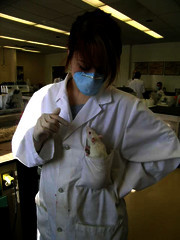Considering the Rules of Ethical Biotechnology
Louise Bouchard has served on several ethics committees which indicates her concern over the rules governing the treatment of living things. Biotechnology teachers must monitor the industry as well as research, whether conducted for medical, nutritional or environmental purposes. Ethical issues arise regularly. A blog run by future law professionals specializing in the field is excellent training for students!
Better Educating Students about the Ethical Aspects of their Profession
A recent evaluation of our program has resulted in the integration of ethical concerns into our courses. The small team of teachers who started to work during the program’s inception in 2003, had focused on the development of scientific and technical content, but we realized from the exercise that we had left the discussion of ethical issues exclusively to philosophy courses.
We are, however, directly concerned. Students learn to handle various forms of living organisms, including laboratory animals. They encounter many practices that challenge their values and raise ethical issues.

Small rodents such as rats are used as study subjects in biomedical research.
The use of domestic animals for medical purposes arouses strong reactions. Anthropomorphizing their situation is not difficult. The rapid development of biotechnology and the methods that we develop for industrial operations must be based on ethical practices. What about the impact of drugs from genetically modified organisms, GMOs themselves (Genetically Modified Organisms.), cloning, and use of stem cells or human subjects for research? We use all types of living organisms in biotechnology from bacteria to man!

Some discoveries made by studying the small plant Arabidopsis thaliana allow us to better understand how cancers grow and to develop treatment strategies.
A Blog that Deals with Concerns and Provides Food for Thought
In the winter of 2008, I had the opportunity to measure student needs and gage their willingness to hold discussions on ethical issues.
In a groundbreaking move, a speaker on this topic was invited for the course ‘Techniques de culture cellulaire’ (Techniques of cell culture) (210-485-HS). Naively, I hadn’t allowed time for debate. The reactions were so strong that I was not able to continue my course in the face of my students’ questions. That’s how I was introduced to the idea of debating and the preparation for debate in 2009 which led me to creating a website.
A Web site that Encourages In-depth Analysis
Claude Martel, then IT Representative, provided invaluable help for this project. He was the guiding force behind my website ‘Intégration de l’éthique à la formation spécifique en biotechnologie’ (Integrating Ethics Into Biotechnology Training) which was designed to provoke reflection and help students develop a perspective on their professional ethics. The Actualités (News) section of this site lists entries chronologically, eventually archiving them. The site was developed with Agora Scriptor designed by literature professor Jean-Yves Fréchette.
To ensure the sustainability of the links listed, Claude Martel advised me to make hyperlinks to documents uploaded from sites, rather than link to the site itself where possible. The article then remains accessible even when the link no longer works. Of course, this could only be done with permission from an article’s author.
What provides real vibrancy to our site is that it has become a court of student opinion.
- We send announcements of upcoming conferences.
- We offer readings.
- The site acts as a springboard to the Net. My students have to develop their positions, which are often arbitrarily assigned, and defend them.
- The debate continues for a month on the blog with the lecturer. Students have told me that they have become better debaters through this process, and even have changed their opinion in the process!
My project had a positive effect on the first two trial cohorts, one of which was quite difficult. They provided considerable feedback about their increased motivation for researching their topic. This year, we discussed freezing stem cells from umbilical cords which could later be used to cure infant illnesses.
The Road to Success using Lecturers from the University of Sherbrooke
The context in which we work: a controlled access blog (They use passwords.)is restricted to my students and lecturers of the program ‘Droit et sciences de la vie’ (Law and Life Sciences), at the University of Sherbrooke. I moderate the blog and can accept or reject posts. None have been dropped in the two years the blog has been up which is an indication of the seriousness with which my students have participated in this activity.
Future law professionals generously participate. After a conference, they still influence the class dialogue by responding to questions. Some of our students have even found a career path hitherto unknown to them, leaving their degree program for ‘Droit et sciences de la vie’. This is how new vocations are born!
The partnership is a great success. My students, who are obliged to participate on the blog and to write a minimum of comments, love the activity.
Looking Ahead
The Winter 2010 lectures have been filmed. They will be edited and uploaded to the site to enrich its contents.
As it is important that my students experience a multiplicity of points of view for our ethical debates to respect the increasingly multicultural and religiously diverse fabric of our society, my students should eventually interact with students from another college as our students’ backgrounds are quite homogeneous.
I hope to integrate students from the Cité collégiale in Ottawa into the blog. Through videoconferencing, students can attend and participate in the debates which will enrich the dialogue on the blog. Other francophone cégeps may eventually wish to either create a similar program and to join ours. The program is offered in CEGEP de l’Outaouais, de Shawinigan, de Saint-Hyacinthe, de Lévis-Lauzon and Ahuntsic.
This is certainly a wonderful illustration of the potential for blogging. A great resource for those inspired by this article is Charles-Antoine Bachand’s excellent report on the pedagogical use of blogs in Profweb. Sophie Ringuet’s report on Using Academic Forums is another great resource. Find out more about these two related formats which are becoming increasingly popular in college classrooms.

